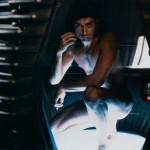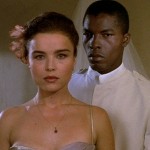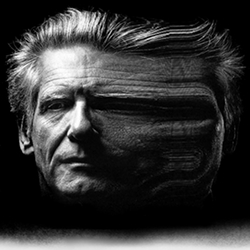
TIFF’s From Within - The Films of David Cronenberg Review: Naked Lunch (1991) - NP Approved
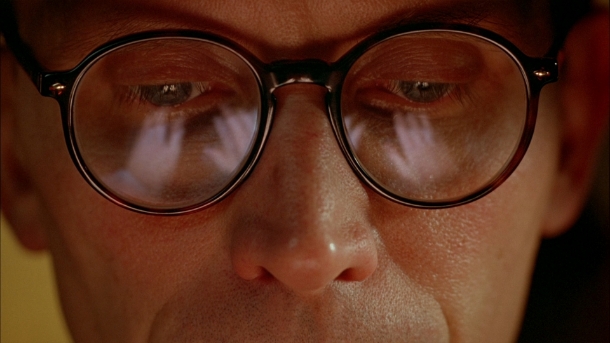
Cast: Peter Weller, Judy Davis, Ian Holm
Director: David Cronenberg
Country: Canada | UK | Japan
Genre: Drama | Fantasy
Official Trailer: Here
Editor’s Notes: The following review is part of our coverage for TIFF’s From Within: The Films of David Cronenberg which runs from November 1st to January 19th at TIFF Bell Lightbox. For more information on upcoming TIFF film series visit http://tiff.net and follow TIFF on Twitter at @TIFF_NET.
It may be self-evident to some, but adaptations of literary works in film are entirely new works of art, inspired by their namesake but filtered through the creative genius of an artist that flourishes through other modes of expression. Cronenberg takes William S. Burroughs’ Naked Lunch and adapts it in the only way possible as he filters it through his own preoccupations, neuroses, and pre-established devices available in the artistic venue of film. Film doesn’t easily offer the boundlessness of literature and so one must find ways to work within the constraints of a medium that has strengths impossible to express through words alone and create art that showcases those strengths while staying rooted in the source material.
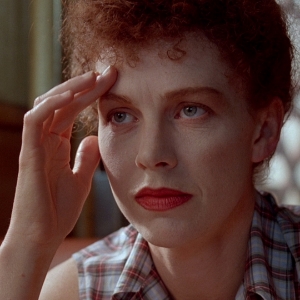 Cronenberg deflects the impossibility of creating an objective interpretation of Naked Lunch by putting it into the framework of film noir that follows a deadpan characterization of Burroughs during a period of creative doldrums as he is involuntarily compelled back to a life of “weirdness” that he seems to have earnestly tried to move past, but his need to create will not allow him to escape. Burroughs (Bill Lee) is portrayed with an immovable stoicism by Peter Weller, and Weller navigates the self-destructive obstacles of the creative process that can overwhelm the genius mind until it is crushed by the weight of the need to create with an innate understanding of its pitfalls and trappings. Bill Lee drifts through life as though he is waiting for the next onslaught of madness to fuel the fires of his creativity, anticipating the destructive forces and steep price of new inspirations with a resigned passivity. He is intrigued and enticed by the promises of a “literary high” from the poisonous bug powder used in his futile attempts at a normal existence as a bug exterminator, but fears the depths and unknown dangers that come with this untested intoxicant. The bored mind is compelled to new forms of weirdness, and Lee enters realms of ambiguous reality with deadpan resoluteness, uncertain of the oddities that begin to invade his life but seduced by their literary and mind-opening potential.
Cronenberg deflects the impossibility of creating an objective interpretation of Naked Lunch by putting it into the framework of film noir that follows a deadpan characterization of Burroughs during a period of creative doldrums as he is involuntarily compelled back to a life of “weirdness” that he seems to have earnestly tried to move past, but his need to create will not allow him to escape. Burroughs (Bill Lee) is portrayed with an immovable stoicism by Peter Weller, and Weller navigates the self-destructive obstacles of the creative process that can overwhelm the genius mind until it is crushed by the weight of the need to create with an innate understanding of its pitfalls and trappings. Bill Lee drifts through life as though he is waiting for the next onslaught of madness to fuel the fires of his creativity, anticipating the destructive forces and steep price of new inspirations with a resigned passivity. He is intrigued and enticed by the promises of a “literary high” from the poisonous bug powder used in his futile attempts at a normal existence as a bug exterminator, but fears the depths and unknown dangers that come with this untested intoxicant. The bored mind is compelled to new forms of weirdness, and Lee enters realms of ambiguous reality with deadpan resoluteness, uncertain of the oddities that begin to invade his life but seduced by their literary and mind-opening potential.
Cronenberg deflects the impossibility of creating an objective interpretation of Naked Lunch by putting it into the framework of film noir.
Lee stumbles through the hallways between the derelicts that temporarily occupy their coldwater flats as the discordant saxophone of Ornette Coleman bleats out the chaotic jazz of junk-sick midnights. We are privy to hypothetical diner conversations between filmic interpretations of Kerouac, Ginsberg, and Burroughs as they discuss their disparate literary processes in mutual admiration, bringing the oft unspoken counterculture of the Fifties to life in dubious yet intriguing hypotheses on how the heroes of the Beat Generation would interact and engage in shared madness. These are outcasts and misfits, unwanted by the faux patriotic and sanctimonious derelicts that define mainstream sensibilities. They walk through streets of cracks and imperfections amidst an unknowing crumbling empire as they are excluded by the strict constraints of the American Dream, Cronenberg’s camera recalling Technicolor stucco walls with its exaggerated imperfections that create beauty out of the slow and inevitable decay that has quietly and ominously haunted every great civilization.
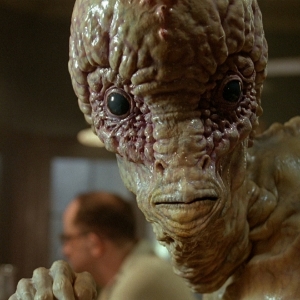 Lee is taunted and seduced by the various typewriters that beckon him and pervert him into succumbing to their unique mechanical movements that warp and manipulate his mindset and writing style. They anthropomorphize into insects offering clandestine missions or warped creatures of bizarre sexual ambiguity and manipulate Lee’s mind into entering dubious realms of paranoia and confused sexuality. They seduce him into engaging in strange and unknown drugs, leaving him uncertain of the objectivity of everything that surrounds him but driven by a need to report from these strange and dangerous lands. He sacrifices health and sanity out of the need to create, and the fictional world of InterZone beckons him back to finish his reports from fictional lands and paranoid missions rooted in tragic events from Burroughs’ life as he is forced to face them directly to achieve the necessary unadulterated creativity and unblinking honesty required to finish his unprecedented work.
Lee is taunted and seduced by the various typewriters that beckon him and pervert him into succumbing to their unique mechanical movements that warp and manipulate his mindset and writing style. They anthropomorphize into insects offering clandestine missions or warped creatures of bizarre sexual ambiguity and manipulate Lee’s mind into entering dubious realms of paranoia and confused sexuality. They seduce him into engaging in strange and unknown drugs, leaving him uncertain of the objectivity of everything that surrounds him but driven by a need to report from these strange and dangerous lands. He sacrifices health and sanity out of the need to create, and the fictional world of InterZone beckons him back to finish his reports from fictional lands and paranoid missions rooted in tragic events from Burroughs’ life as he is forced to face them directly to achieve the necessary unadulterated creativity and unblinking honesty required to finish his unprecedented work.
Cronenberg’s Naked Lunch forgoes the satirical surrealism of bureaucratic nightmares that make Burroughs’ version beautifully repulsive and subversively compelling and creates a world borne from both the source material and the endlessly intriguing life of the man who created it. Burroughs created art that reported on the conditions of the streets with its colorful poet junkies and sexual “deviants” that created the smoky jazz of dark alleyways and all night diners, wafting through the towers of the complacent and privileged offering muted seduction and whispers of confrontation offering unwanted reminders that the unsightly denizens of the world below cannot be ignored forever.
Related Posts
![]()
Matthew Blevins
![]()
Latest posts by Matthew Blevins (see all)


